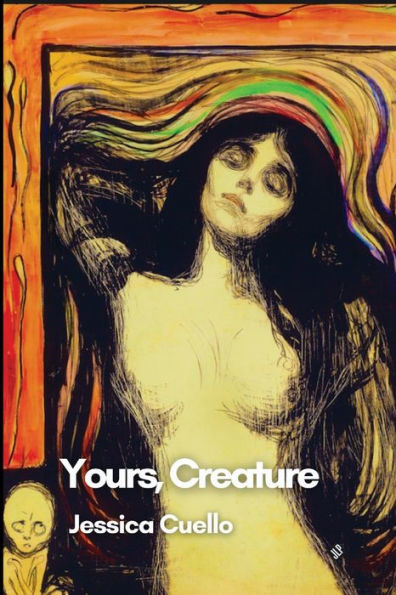Yours, Creature, the newest poetry collection by Jessica Cuello, is a collection of epistolary persona poems written from the point-of-view of Mary Shelley. These poems capture the romance that we as a culture often project on what it must have been to be Shelley and also the horror too. Shelley’s life has often been idealized and seen as beautifully artistic, but of course, she lived through the trauma of losing multiple children and her mother. Her father was distant to the point of abuse, and Lord Byron and Percy Bysshe Shelley were sexist and controlling. Cuello captures all of these aspects of her life, and she cultivates an understanding of her life so that those trials that she goes through help us to see what is universal in her pain and her life. She who was isolated and often neglected becomes emotionally understandable to we who have lived through the last few years of self-isolation and distancing. Before the pandemic, of course, we were already suffering from the depersonalization endemic to modern society. Cuello’s Shelley would have recognized that and understood us. She is one of us and reading this book for me was like exploring the consciousness not only of one of the great writers of English literature but mine as well. Yours, Creature is a work of exceptional sensitivity and thoughtfulness.
These letters, especially toward the beginning of the collection, are addressed to her mother, Mary Wollstonecraft, who died shortly after giving birth to Mary Shelley, and they address an emptiness that so many people feel. These letters become emblematic of those feelings of exile and isolation that are so present for many people. Compounded with this is her father’s, William Godwin, rejection of her. She addresses these feelings in one poem:
. . . Father hated me for being sad.
. . . I was a tent stitch
on the pocket of his mind, a grafted
cut in his bark of book (16).
She feels like an afterthought in her own world, and the true Godwin seems to have used her in this way after his remarriage and certainly after she became pregnant with Percy Bysshe Shelley’s child before they were married, and he would not see her. She is used as status or for sex and then is forgotten once she is no longer useful to the people in her life. This isolation is so often a part of the human condition and especially true for many women who are neglected and forgotten. Cuello, however, also shows us the value of an artistic life through Shelley’s letters to her creature, her creation in Frankenstein to whom she writes:
. . . Sometimes I listened
for you when I touched P. [Percy]
You came with his voice.
His hand could draw you (66-67).
Her creation becomes a way for her to survive the traumas of her life. In this way, Yours, Creature, is a discussion of how the artist’s life can help to make the pain of life more bearable.
Cuello also develops a character who is trying to fix her past relationship with her present relationships, which is as doomed an experiment for her as it is for all who have tried to do exactly that. That might be most or even all of us.
Until I have a father
[Percy] can be my father;
Half a father, door-turned
father, father of the residence,
father broke and broken,
father borrowing from
the child, father drubbing,
father pages, father lies (34).
This is so often the way with our relationships. Because those people who should have loved us well haven’t, we expect those in our current relationships to step up and fix the wounds inside of us. Of course, there is no way they could possibly do this, and they shouldn’t. They are most likely unaware of what we hope from them, and so the process is doomed to failure. Percy Bysshe Shelley failed Mary Shelley on many fronts, but Cuello’s poetry seems to suggest that even if he hadn’t treated her as poorly as he had, theirs would have been an unsatisfying relationship from the beginning. The missing mother and the absented father seem to have set Cuello’s Shelley up for a difficult if not impossible emotional life.
Of course, there is no way to be sure to what degree this represents the actual life of Mary Shelley, but the collection does dig deeply into a profound human truth about the nature of depersonalization and how we seek love when we are in a world that seems to be bereft of it. I feel Mary Shelley’s pain deeply because it has been my pain often. I think it has been all of our pain, and Cuello’s exploration of that aspect of the genius of Mary Shelley opens up new ways for me to see myself. It also got me thinking about Shelley’s Frankenstein and the pain of all of the characters involved. Yours, Creature is truly an exceptional creation.
*

